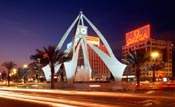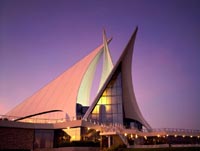|
Dubai
 Lying on the
southern shores of the Arabian Gulf, Dubai is one of the seven
states which make up the United Arab Emirates. Located at the
crossroads between East and West, the emirate's long-standing
trading tradition has for centuries brought visitors from
throughout the Middle East and neighbouring regions. Lying on the
southern shores of the Arabian Gulf, Dubai is one of the seven
states which make up the United Arab Emirates. Located at the
crossroads between East and West, the emirate's long-standing
trading tradition has for centuries brought visitors from
throughout the Middle East and neighbouring regions.
 History History
Today, Dubai plays host to an increasing number of visitors from
the West and the Far East. The city attracts travelers seeking
something new and different, offering international facilities
combined with the adventure of the Middle East, and exotic
destination with a cosmopolitan lifestyle.
Originally a small fishing settlement, Dubai was taken over
around 1830 by a branch of the Bani Yas tribe from the Liwa
oasis led by the Maktoum family who still rule the emirate
today.
 Traditional activities included herding sheep and goats,
cultivating dates, fishing and pearling. The liberal attitudes
of the emirate's rulers made Dubai attractive to traders from
India and Persia who began to settle in the growing town, which
soon developed a strong reputation as the leading entrepot for
the region. An independent emirate for most of its history, in
1971 Dubai came together with Abu Dhabi, Sharjah, Ajman, Umm Al
Quwain, Fujairah and (in 1972) Ras Al Khaimah to create the
federation of the United Arab Emirates. Traditional activities included herding sheep and goats,
cultivating dates, fishing and pearling. The liberal attitudes
of the emirate's rulers made Dubai attractive to traders from
India and Persia who began to settle in the growing town, which
soon developed a strong reputation as the leading entrepot for
the region. An independent emirate for most of its history, in
1971 Dubai came together with Abu Dhabi, Sharjah, Ajman, Umm Al
Quwain, Fujairah and (in 1972) Ras Al Khaimah to create the
federation of the United Arab Emirates.
The discovery of oil in 1966 dramatically transformed the
emirate by allowing the development of the economic and social
infrastructure which laid the foundations for today's modern
society.
 Much of the credit for this development can be traced to the
vision of the late Ruler, HH Sheikh Rashid bin Saeed Al Maktoum,
who ensured that Dubai's oil revenues were deployed to maximum
effect. His work has been continued by the present Ruler, HH
Sheikh Maktoum bin Rashid Al Maktoum. It is located on the
southern shore of the Arabian Gulf. It has an area of some 3,900
square kilometres. Outside the city itself, the emirate is
sparsely inhabited and characterized by desert vegetation. The
landscape ranges from rugged mountains to majestic sand dunes.
These days, oil contributes just twenty per cent of economic
production. Trading, manufacturing and services—including
tourism—now dominate the economy. Much of the credit for this development can be traced to the
vision of the late Ruler, HH Sheikh Rashid bin Saeed Al Maktoum,
who ensured that Dubai's oil revenues were deployed to maximum
effect. His work has been continued by the present Ruler, HH
Sheikh Maktoum bin Rashid Al Maktoum. It is located on the
southern shore of the Arabian Gulf. It has an area of some 3,900
square kilometres. Outside the city itself, the emirate is
sparsely inhabited and characterized by desert vegetation. The
landscape ranges from rugged mountains to majestic sand dunes.
These days, oil contributes just twenty per cent of economic
production. Trading, manufacturing and services—including
tourism—now dominate the economy.
Dubai Attractions
• year-round sunshine
• uncrowded, clean sandy beaches
• luxury modern hotel accommodation
• tolerant welcoming ambience
• crime-free environment
• cosmopolitan lifestyle (alcohol is available in hotels)
• varied nightlife
• Arabian heritage
• exotic sights and experiences
• desert safaris
• bargain shopping (Dubai is a tax-free city)
• fabulous water sports
• deep-sea fishing and scuba diving
• three championship golf courses
• direct air links to more than 100 cities |